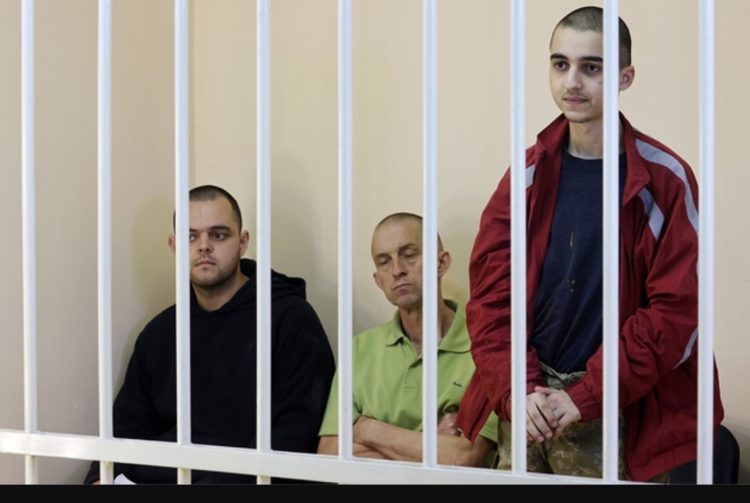Those in England & the United Kingdom saying to stop tweeting about Aiden Aslin & Shaun Pinner because the government asked for quiet.
GUESS WHAT.
The guys have been forced to plead guilty.
There is no more time for silence.
Russia and the "DPR" are guilty of war crimes. pic.twitter.com/t4rvfM8c4N
— Sarah Ashton-Cirillo (@SarahAshtonLV) June 9, 2022
The three men now face the death sentence through execution by firing squad. Aslin, Pinner, and Brahim, all of whom were situated behind metal bars of a courtroom, showed no emotion as each took turns standing up to show that they understood the sentence that had been levied on them. However, the three men were told that they had a month to appeal the decision, which could let them off the death penalty to just 25 years to life in prison.
The two Britons indicated that they understood the sentence. Aslin and Pinner were observed to have lost a tremendous amount of weight but showed no current signs of physical abuse.
In defense of the death penalty, Judge Alexander Nikulin stated that he had been guided by the unshakable principle of justice when giving the death sentence to the three men.
“It was that which made it possible to take this complex and difficult decision to apply an exceptional measure of punishment in the form of the death penalty,” he said.
Needless to say, the British Government was not happy with the trials, with UK Foreign Secretary Liz Truss condemning it. “I utterly condemn the sentencing of Aiden Aslin and Shaun Pinner held by Russian proxies in eastern Ukraine,” she said.
“They are prisoners of war. This is a sham judgment with absolutely no legitimacy. My thoughts are with the families. We continue to do everything we can to support them.”
Let’s get the facts right as claiming they are foreign fighters is what is forming a basis for their death sentence. Aiden Aslin and Sean Pinner were both members of Ukraine’s 36th Marine Brigade not Foreign Legion. Aiden even took an oath on camera and became an official soldier https://t.co/96qLyUkOJI pic.twitter.com/MAFWB1xHxK
— ELINT News (@ELINTNews) June 9, 2022
The conservative chairman of the House of Commons Foreign Affairs Committee was also infuriated with the separatist so-called Supreme Court decision, referring to the so-called Donetsk People’s Republic as “not a state” and “not a court” with its judges merely dressing up as judges and pretending to be impartial.
“These men are prisoners of war. The charges against them are a violation of their rights – Russia is using them as hostages.”
British Prime Minister Boris Johnson, through his spokesman, stated that they were “deeply concerned” about the trials.
“Under the Geneva Convention, prisoners of war are entitled to combatant immunity, and they should not be prosecuted for participation in hostilities,” the statement read.
“So we will continue to work with Ukrainian authorities to try and secure the release of any British national who was serving in the Ukrainian armed forces and who are being held as prisoners of war.”
These trials are seen as revenge for the Ukrainian Government prosecuting Russian soldiers for war crimes. The 21-year-old Russian soldier Vadim Shishimarin was found guilty of shooting a 62-year-old Ukrainian man. Shishimarin said his superiors ordered him to shoot the man as they were worried he would report their position away. Two more Russian soldiers, Alexander Bobikin and Alexander Ivanov pled guilty to “violating the laws and customs of war” as they shelled the Kharkiv region from Belgorod. Russian soldier Mikhail Romanov is also to be tried in absentia after being identified as the soldier who killed a Ukrainian man and raped the man’s wife.
When Aslin and Pinner were captured Russia offered to exchange them immediately for Pro-Russian politician and close Putin ally Viktor Medvedchuk, who was captured by Ukrainian forces early in the war. Medvedchuk was considered a Putin crony and was central to aiding Russia in the initial separatist war in 2014. The offer was rejected. These death sentences may be leverage for Russia to still get him released.
These war crime trials from both sides will continue as both countries try to gain the upper hand against one another. While Ukrainian trials were more orderly as the Russian soldiers could defend themselves with a court-appointed lawyer and be guided by former international criminal court judges, the Russian trials were cruder, with the Ukrainian soldiers not being able to defend themselves.










COMMENTS